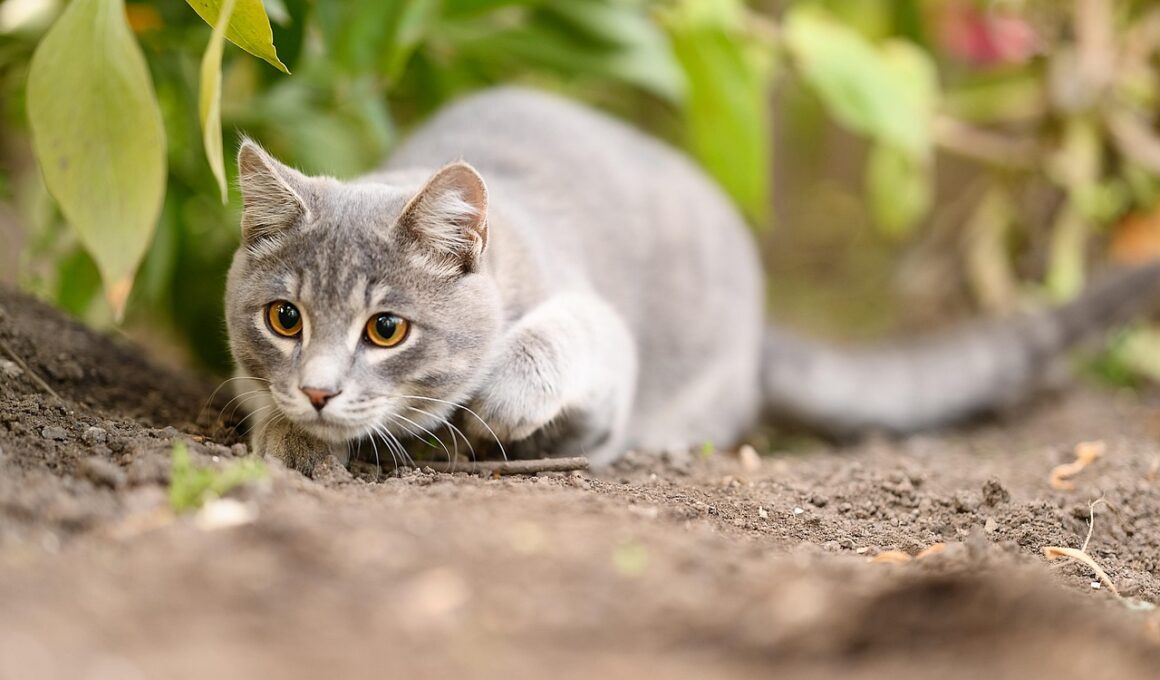How Early Experiences Shape a Cat’s Hunting Skills
Understanding a cat’s hunting instincts is fundamental for effective cat parenting. Cats, as natural hunters, rely on a range of skills honed from a young age. These skills begin developing even before a kitten opens its eyes, highlighted by their interactions with their mother and littermates. The essential play behavior observed in these early stages plays a crucial role in fostering their hunting capabilities. Kittens engage in mock hunting as a means of practicing their predatory skills. This includes stalking, pouncing, and capture, mimicking the behaviors they will utilize as adults. Observational learning also occurs during this time; kittens learn by watching their mother hunt and manage prey. This early modeling significantly bolsters their confidence and sharpens their instincts. Understanding these dynamics provides greater insight into how to nurture and support your cat’s hunting abilities. By providing appropriate environments and social interactions, cat owners can play a role in shaping their cats’ skills. Additionally, early socialization positively impacts their adaptability and hunting success. Thus, understanding the formative experiences during kittenhood can inform better cat-parenting practices.
As your cat matures, the early lessons learned during kittenhood will manifest in various ways. Their proficiency in hunting can affect their behavior both positively and negatively. Ideally, a well-socialized cat exhibits a balanced approach to hunting, displaying curiosity and excitement. However, those that miss out on early experiences may exhibit less confidence and hesitation in new settings. Providing stimulating environments facilitates ongoing development of these hunting skills throughout their lives. Simple toys and activities designed to mimic prey can enhance their natural instincts. It’s essential to actively engage your cat in play, combining physical and mental challenges to hone these skills. When selecting toys, choose those that encourage stalking and pouncing behaviors, as they simulate the natural hunting process. Rotation of toys keeps your cat interested and engaged over time, preventing boredom. Moreover, hiding treats around your living space can inspire them to employ their hunting instincts while exploring. This supports both mental stimulation and exercise, contributing to a well-rounded cat. Ultimately, a proactive approach to their play and environment will yield positive results in their innate abilities and overall happiness.
The Role of Socialization in Hunting Skills
Socialization during kittenhood is a key factor contributing to a cat’s hunting abilities. Kittens gain invaluable insights from their interactions with other cats, particularly with their mother and siblings. These experiences teach them crucial social cues and boundaries in the realm of play and competition. Engaging in playful aggression helps them understand the dynamics of hunting and being hunted. For instance, playful wrestling can develop their physical coordination while also teaching them to read body language. The absence of these interactions can lead to behavioral struggles later in life; such cats may become overly skittish or overly dominant in hunting scenarios. The way a cat approaches their environment is often shaped by their early exposure to different stimuli and social interactions. Parents can help by ensuring kittens have various playmates and experiences early on. This balanced exposure fosters confidence and adaptability, which directly correlates with successful hunting skills. Encourage interactions that are safe yet encouraging exploration, enabling kittens to learn the subtleties involved in hunting. This early play can greatly influence their approach to independence and confidence as adult cats.
Furthermore, positive experiences during formative years can enhance a cat’s ability to interact with their environment effectively. A well-socialized cat is likely to develop an exploratory nature, which is vital for hunting. When cats are timid and fearful, they often hesitate to engage with their surroundings or hunt effectively. Comparing a well-socialized cat to one that lacks early social exposure showcases vast differences in their hunting capabilities. The former tends to experiment more, while the latter may remain perched safely on the sidelines. Providing interactive toys or engaging in interactive play that simulates hunt scenarios can enrich their environment and boost confidence. Encouragement through rewards for mimicking hunting actions reinforces positive behavior and creates a stimulating atmosphere for learning. Moreover, incorporating training sessions focusing on target chasing can refine their skills further. The aim is to create an ongoing cycle of reinforcement that sustains and encourages the natural instincts within your feline companion. It’s essential not to overwhelm them too quickly. Slowly introducing challenges allows them to adapt at their pace while enhancing their capabilities over time.
Understanding Environmental Influences
A cat’s environment greatly impacts its hunting skills as well. Indoor cats, while safe, may lack the same opportunities to practice hunting as outdoor cats. Statistically, outdoor cats might have better-developed skills due to exposure to real prey and various terrains. However, this doesn’t mean indoor cats cannot hone their hunting instincts; it just requires a bit more creativity from their owners. Carefully designing an environment that stimulates these instincts is key. Scratching posts, climbing structures, and interactive toys can replicate natural hunting conditions indoors. Furthermore, ensuring cats have access to windows where they can observe birds and squirrels can cultivate their interest in hunting. Rotating toys and adding new ones can replicate the thrill of the hunt, while puzzles can engage their critical thinking abilities. Creating a rich environment that mimics the unpredictability of nature can improve a cat’s adaptability. Thus, building an environment conducive to their instincts showcases a commitment to their well-being. With patience and thoughtfulness, owners can create a sanctuary that encourages both emotional satisfaction and physical development in their cats.
Moreover, transitions in environment can also affect a cat’s hunting instincts. Moving homes or introducing new pets offers various challenges and opportunities for growth. Cats that face changes exhibit differing responses based on their early experiences. Kittens accustomed to various stimulus exposure adapt more fluidly to new situations. Such adaptability enhances their confidence when exposed to unfamiliar stimuli or potential hunting scenarios. In contrast, cats with limited exposure tend to retreat or express nervous behaviors. During such transitions, it’s crucial to acknowledge the impact of the familiar on their psyche. Providing comforting familiar items or engaging them in familiar activities can ease their stress. Incorporate interactive toys or create opportunities for play in new settings, reminding them of their natural instincts. Creating a positive reinforcement loop enhances their mental and emotional resilience, vital for adapting to life’s changes. In addition to easing transitions, play can reaffirm their confidence and hunting skills. Owners should be attentive to signifying increases in stress and provide support where necessary.
Fostering Lifelong Skills
As a cat transitions into adulthood, the foundation laid during its early years continues to influence its hunting prowess significantly. Regular engagement with their instincts is essential to keep their skills sharp and ensure they remain physically active. Many cat owners mistakenly believe that once a cat reaches adulthood, hunting instinct will naturally diminish without stimulation. However, this couldn’t be further from the truth. Regularly scheduled playtime is necessary to maintain these abilities. Introducing creativity into play can spark curiosity and replay essential predatory moves. Structured and varied play improves their hunting approach, ensuring cats remain interested and engaged. Enriching their surroundings not only maintains their hunting skills but also promotes physical health, emotional well-being, and reduces behavioral issues. Healthy, engaged cats are less prone to stress and anxiety, leading to a more harmonious living environment for both cat and owner. Ultimately, continuous learning opportunities during all stages of life contribute to a healthy and satisfied feline companion. Thus, engaging in consistent play to shape, foster, and maintain your cat’s hunting instincts throughout its life is paramount.
Cats are fascinating creatures whose hunting instincts can be nurtured through dedicated and thoughtful cat parenting. The foundation of their skills is established in the critical early stages of their development. Parents should remember that these instincts can be programmed, enhanced, and significantly influenced through consistent engagement and socialization. By providing cats with stimulating environments and opportunities for play, cat owners can ensure that their beloved companions grow into confident, skilled hunters. Regular play allows kittens to practice key skills essential for their future hunting prowess. Owners must remain observant and attuned to their cat’s individual needs, adapting their methods to foster joy and confidence in each unique feline. By understanding the significance of early experiences, owners can significantly enhance their relationships with their cats and improve their overall feline companions’ quality of life. The synthesis of socialization, environment, and proactive engagement forms a triad for success in the cultivation of their hunting instincts. Remember, investing in a cat’s early experiences will yield a lifetime of enriched hunting and social behavior. As caretakers, being mindful of these critical aspects can lead to fulfilling companionship for years ahead.


